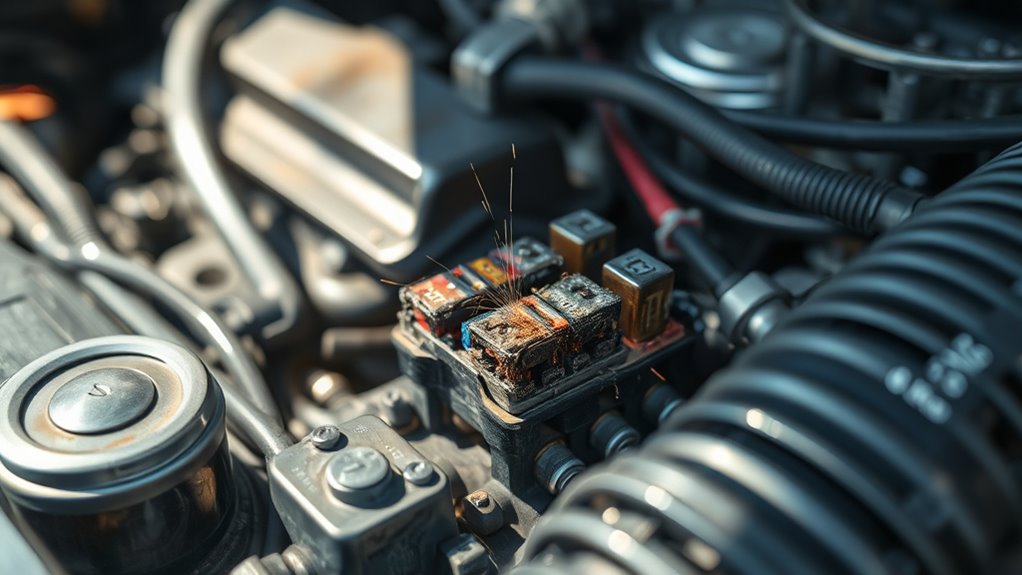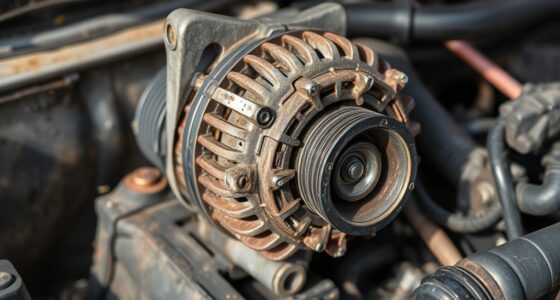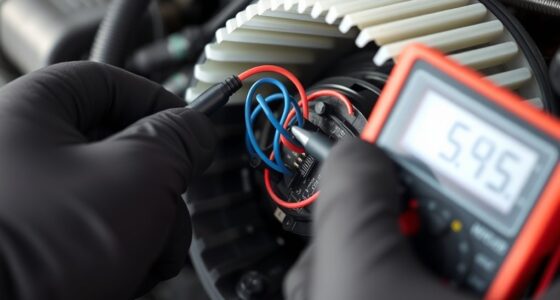If your car keeps blowing fuses, it’s usually caused by a short circuit or overload in your wiring system. Damaged, frayed, or exposed wires often touch metal parts or other wires, creating a direct path for current that overloads the fuse. Moisture and corrosion can also contribute. To fix this, inspect your wiring for damage and address any issues promptly. Keep going to understand how to identify the root cause and prevent future fuse failures.
Key Takeaways
- A short circuit caused by damaged or exposed wiring can overload and blow fuses repeatedly.
- Faulty or malfunctioning electrical components, like relays or switches, may draw excessive current.
- Corrosion, moisture, or loose connections in the fuse box increase resistance and cause fuse blowouts.
- Recent repairs or modifications might have introduced wiring faults or incorrect fuse ratings.
- Worn or frayed wiring can create unintended contact points, leading to frequent fuse failures.

Car fuse problems are a common issue that can leave your vehicle suddenly inoperable or cause certain systems to malfunction. When your fuse keeps blowing, it’s often a sign that something within your car’s electrical system isn’t quite right. One of the main culprits behind frequent fuse failures is electrical shorts. An electrical short occurs when a live wire comes into contact with a grounded surface or another wire, creating a direct pathway for current to flow where it shouldn’t. This sudden surge can overload the fuse, causing it to blow and protect the rest of the system from damage. Electrical shorts can happen for various reasons, but faulty wiring is a common cause. Over time, wires can become frayed, cracked, or damaged by wear and tear, exposing the conductive core. When that happens, the exposed wire may come into contact with metal parts or other wires, creating a short circuit. If you notice your fuse blows repeatedly and there’s no obvious reason like a new electronic device or accessory, faulty wiring is likely at fault.
Another reason your fuse might keep blowing is that the electrical components connected to that fuse are drawing more current than they should. This can happen if a component becomes faulty or if there’s an internal short within that device. For example, a malfunctioning alternator or a damaged relay can cause excessive current draw, leading to blown fuses. Additionally, sometimes corrosion or moisture can affect wiring connections, increasing resistance and causing overheating or shorts. When moisture gets into the wiring harness or fuse box, it can create unintended electrical pathways, triggering fuse failures. Proper electrical system maintenance can help prevent many of these issues from arising.
To troubleshoot these issues, start by inspecting the wiring connected to the problematic fuse. Look for visible signs of damage like cracks, burns, or corrosion. If you find damaged wiring, it’s best to replace it rather than try to patch it up. If the wiring looks intact, consider whether recent repairs or modifications might have introduced faulty wiring or loose connections. In some cases, a professional can perform a wiring diagram check and use diagnostic tools to pinpoint the exact cause of the short. Remember, repeatedly replacing blown fuses without addressing the underlying problem only masks the issue and risks further damage to your vehicle’s electrical system. By addressing electrical shorts and faulty wiring promptly, you can prevent your fuse from blowing and keep your vehicle running smoothly.
Frequently Asked Questions
Can a Faulty Alternator Cause Fuse Blows?
Yes, a faulty alternator can cause fuse blows. When your alternator fails, it may create electrical shorts or send irregular voltage to your car’s electrical system. This excess or unstable current can overload circuits and blow fuses. If your fuses keep blowing, it’s wise to check the alternator for failure, as it plays a vital role in maintaining proper electrical flow and preventing these issues.
How Often Should I Replace Blown Fuses?
You should replace blown fuses as soon as they blow, rather than repeatedly replacing them. Regularly check your electrical system and make certain fuse ratings match the manufacturer’s recommendations. Don’t delay, as ignoring blown fuses can damage your electrical system. Keep a spare set handy, and inspect fuses periodically to prevent persistent problems. Proper precautions safeguard your vehicle’s essential functions and keep your electrical system running smoothly and safely.
Are Aftermarket Accessories More Likely to Blow Fuses?
Yes, aftermarket accessories are more likely to blow fuses if they aren’t compatible with your vehicle’s fuse system. You need to check fuse compatibility before installation, as some accessories draw more current than the fuse can handle. Always follow manufacturer instructions and use the correct fuse ratings to prevent blowing fuses. Properly installed, aftermarket accessories should not cause frequent fuse issues, but incompatible parts definitely increase the risk.
Can a Bad Ground Connection Cause Fuse Issues?
A bad ground connection can cause fuse issues, acting like a loose bolt in your car’s electrical system. When wiring issues or a poor ground connection exist, it disrupts the flow of electricity, causing fuses to blow. You might notice flickering lights or blown fuses more often. Check your ground connection and wiring carefully—tighten or repair any loose or corroded grounds to keep your electrical system running smoothly.
What Tools Are Best for Diagnosing Fuse Problems?
To diagnose fuse problems, you should use a multimeter for circuit testing, which helps you identify faults accurately. A fuse tester or a test light can also be useful for quick checks. When you find a blown fuse, replace it with one of the same amperage. Regular fuse replacement and circuit testing guarantee your car’s electrical system stays reliable and prevents future fuse blowouts.
Conclusion
If your car keeps blowing fuses, it’s a sign of underlying electrical issues you shouldn’t overlook. Regularly inspecting your fuse box and addressing wiring problems can save you from costly repairs down the line. Did you know that over 60% of vehicle fires are caused by electrical system failures? By catching issues early, you not only protect your car but also ensure your safety on the road. Stay vigilant and keep those fuses intact!









